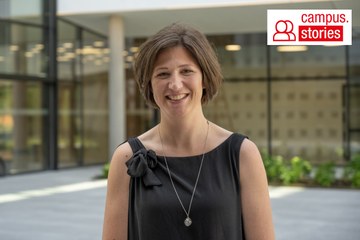campus.stories: Elisabeth Höld

Senior researcher and lecturer Elisabeth Höld looks forward to the new labs and the Open-Air Teaching Space
Elisabeth Höld conducts research at the Institute of Health Sciences and teaches in the health-related study programmes of the St. Pölten UAS. In this interview, she tells us how her daily work will change with the new Campus St. Pölten.
Interview with Elisabeth Höld
What are you looking forward to in particular when it comes to the new campus?
Höld: There are several things that I’m eager for: as a researcher, I’m obviously excited about the new labs.
Our Kitchen Lab and the Body Composition Lab in particular will become central elements of our dietetic research work. In my opinion, these two labs are exemplary of our research activities that combine basic theoretical principles, such as the effect of a certain diet on the composition of the body, and their practical implementation, for example the preparation of meals that are both healthy and tasty.
As a lecturer, I love the idea of getting to teach outdoors in the campus garden. And as a staff member, I look forward to the great new infrastructure such as the library, the spectacular entrance hall and even the many bicycle racks that will hopefully be used a lot. It is these areas that make the campus really “come alive”.
(How) will your daily work change?
My workplace situation will be the biggest change: I will move from a secondary location of the St. Pölten UAS to the new campus, which means shorter walking distances and getting to meet more colleagues from other units casually in the corridors. I’m very curious about the new “shared desk” principle as well.
What is it that makes the new campus a “Campus of the Future” for you?
For me, one of the most important things about the “Campus of the Future” is the open design of the new building. And by “open”, I mean both the architectural conception, which promotes interdisciplinary research and new teaching and learning concepts at the same time, and the openness towards our surroundings. After all, I believe that a “Campus of the Future” should contribute to the positive development of our university and of our region.